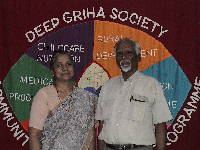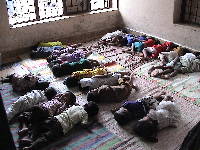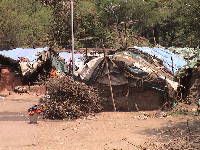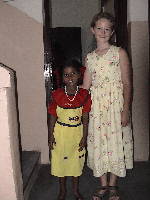Home
Introduction
Japan
China
Singapore
Malaysia
Indonesia
New Zealand
Australia
Bali
Thailand
India
Mumbai
Pune
Goa
Hospet/ Hampi
Mamallapuram
Deep Griha
Agra
Delhi
England
France
Reflections
|
|
After settling back into the Sangams WAGGS centre in Pune, we took a
rickshaw on Monday morning to Deep
Griha to find out how we could help for our two weeks of volunteer
time. Deep Griha is a charitable organization started 27 years ago by Dr.
Neela Onawale and Reverend Bhaskar Onawale to provide child and family
health care and development to people living in the slums and outlying
villages in the Pune area.
We expected to be assigned to help in the balwadis (pre-schools) with craft
programs, or perhaps do some computer work. However when we arrived we
were told that one of Deep Griha's long term donors was nominating both
Neela and Bhaskar for the Kellogg's
Hannah Neil World of Children Award. They had e-mailed Neela the night
before we arrived to ask her for some operating statistics and a biography
in support of the application. Neela was wondering how to incorporate this
request into her busy schedule, when Sarah and I arrived in her office. She asked us to come up with the
initial drafts. This meant that we got to spend most of our time listening to Neela and
Bhaskar talk about their lives. It was an honour, a source of inspiration,
and a wonderful experience to do this.
Here is an excerpt from the biography that Sarah wrote. It is Neela
talking, and at the time, Bhaskar was a lecturer at the UTSM seminary:
"On July 5th, 1975 we opened a dispensary for
women and children, which operated from one room of our house on the
Seminary campus. I was the only member of staff and went without pay. I
was warned that it may take a while before I had any patients, but
fortunately I had my first patient within 24 hours. Treatment was
provided for a nominal fee ($0.12 US), but no patient was ever sent away
because of lack of money. Over the next 25 years, tens of thousand of
patients were to visit me at the various dispensaries I ran in the slum
areas and in the villages.
In 1976 an 18 month old girl, Shobha, was brought to
the dispensary by her grandmother suffering from a cold. I found the
girl to be severely marasmic (undernourished) and underweight. When I
discussed this with the Grandmother, the Grandmother said the parents
had been told that Shobha was under the influence of evil spirits, and
as long as she was in the house there would be poverty. As a result,
Shobha was left outside to sleep, which was why she caught a cold. This
incident, together with other cases of superstitions, under nourishment,
and parent's inability to recognize symptoms of malnutrition, motivated
me to commence the Nutrition Program. It also planted the seed to
commence education for mothers, as we realized that we could really only
make a difference to the lives of the children if we educated the
Mothers. Shobha was the first child that I started feeding. Initially I
fed some of the children with our own food, but then food was graciously
provided by others. Very quickly the number of children fed grew to 150.
However the Seminary terms and conditions that allowed me to operate a
clinic did not really foresee having 150 children running around their
grounds. With the financial aid from the Trinity Episcopal Church of
Princeton, New Jersey, Deep Griha bought a bigger building close to the
slum in the Tadiwala Road area."



|
Neela's venture now has about 140 staff. Programs cover child and
family development - health care, nutrition, counseling,
coaching classes to help children with homework, literacy classes for
people of all ages to learn to read, adult education, technical training
courses (computer, sewing, etc) and more. Her programs and efforts have helped
thousands of people over the last 27 years. She gave up practicing
medicine a few years ago, and now spends all of her time with Administration
and Fund Raising.
Neela has a unique ability to make people want to help her cause. She is
also terrific at fostering ideas - the person who came into her office
years ago suggesting an Adult Education program, now runs
that program in Deep Griha and has won a national award for doing it.
Suffice to say that Sarah and I were both a bit awestruck after our two
weeks. It was incredibly rewarding and we certainly learned some
fundamental lessons about life. In the depth of what most of us
would consider tremendous poverty, a lot of people appear far happier than
many people we know who have, by all material measures, enormous wealth.
The middle picture is a crèche that looks after children while their
parents work - it is naptime. As you can see, the children are
extraordinarily well behaved. Imagine trying to get 25 Canadian toddlers
to sleep in the same area! The third picture is the migrant worker houses in the
Ramtekadi slum. Most other parts of the slum are 'nicer' with brick walls
and tin roofs - although they tend to be just as small for each family.
|
 |
Heather enjoyed her time at Deep Griha - she often assisted the other
volunteers in their craftwork with the kids. She also picked out the child
she wanted to sponsor: Komal Geikwad, aged 6, is cute as a button, but
quite shy. She did not know what to make of Heather. Komal's father died
in a fire when she was a baby. She now lives with her Mother, grandparents
and uncles. Heather's sponsorship will fund schooling in english, nutrition and
various other services from Deep Griha for Komal. We look forward to
watching her grow up and wish her well.
The volunteer work was less of a success for Mark and Chloe. They are
less craft oriented, and had a harder time motivating themselves to help
out with things they did not like doing.
|
We did visit one other organization while we were in Pune. On our day
off, Teresa (a former Sangam employee who we were introduced to through a
New Zealand Guider), organized a visit to Anand Gram, a leper colony near
Pune. The colony was started years ago when there was a tremendous social
stigma attached to Leprosy. People with leprosy, regardless of caste,
would be shunned by their families and by society at large. The disease can now be
cured, so the colony exists for an increasingly aged population. They
started a school a few years ago, and now bring children of parents with
leprosy from all over India. The children can attend school without being
taunted because they are children of leprosy victims.
On my birthday, we attended the "Catch Fever" musical
performance put on by staff, volunteers, and friends of Deep Griha. The
goal was to increase local awareness of Deep Griha. This was the first
time they put on a show like this, and it was excellent - we heard some tremendously
talented amateurs.
After spending two extra weeks in Pune, we needed to extend our visit
in India. Of course, we knew this a long time ago, but it never occurred
to us that it would be difficult. We called Lufthansa to change our onward flight
to London from May 5th to the middle of May, and found that we'd be
about 100th on the waiting list for a flight that was already 70 people
overbooked. We were hoping to visit Rajasthan, but now only have time
for Delhi and Agra. We'll have to go to Rajasthan on our next trip to
India, whenever that is.
Having to take our early flight meant we had to get a train ticket in a
hurry too. This is very difficult to do as it is holiday season and trains
get booked months in advance. We ended up having to
ask for an 'emergency quota' train ticket.
We got only four bunks for the five of us, but at least we got to
Agra.
|
